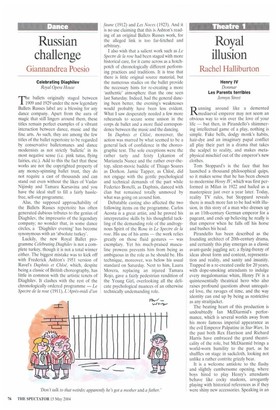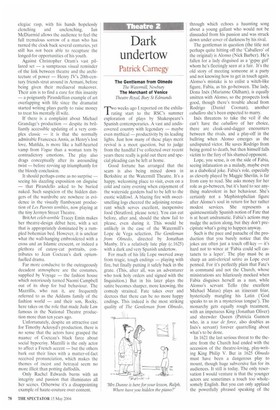Royal illusion
Rachel Halliburton
Henry IV Donmar Les Parents terribles Termyn Street unning around like a demented .I‘mediaeval emperor may not seem an obvious way to win over the love of your life — but then, in Pirandello's shimmering intellectual game of a play, nothing is simple. Fake bells, dodgy monk's habits, hair-dye and an imaginary papal conflict all play their part in a drama that takes the scalpel to reality, and makes metaphysical mischief out of the emperor's new clothes.
Tom Stoppard's is the face that has launched a thousand philosophical quips, so it makes sense that he has been chosen to modernise Henry IV, which was first performed in Milan in 1922 and hailed as a masterpiece just over a year later. Today, reality TV rules, but Stoppard reveals there is much more fun to be had with illusion, in this story of a man who dresses up as an 11th-century German emperor for a pageant, and ends up believing he really is that emperor when he falls off his horse and bashes his head.
Pirandello has been described as the founding architect of 20th-century drama, and certainly this play emerges as a classic avant-garde juggling act; a flying-frenzy of ideas about form and content, representation and reality, and sanity and insanity. Trapped in a re-created castle for 20 years, with dope-smoking attendants to indulge every megalomaniac whim, Henry IV is a quintessentially theatrical hero who also raises profound questions about unrequited love, the ravages of time, and the way identity can end up by being as restrictive as any straitjacket.
The beating heart of this production is undoubtedly Ian McDiarmid's performance, which is several worlds away from his more famous imperial appearance as the evil Emperor Palpatine in Star Wars. In the past both Rex Harrison and Richard Harris have embraced the grand theatricality of the role, but McDiarmid brings a world-worn humility to the part, as he shuffles on stage in sackcloth, looking not unlike a rather contrite grizzly bear.
It is a welcome antidote to the flashy and slightly cumbersome opening, where boys hired to play Henry's attendants behave like cocky students, arrogantly playing with historical references as if they were shiny new accessories. Speaking in an elegiac rasp, with his hands hopelessly clenching and unclenching, Ian McDiarmid allows the audience to feel the full tremulous sorrow of a man who has turned the clock back several centuries, yet still has not been able to recapture the longed-for opportunities of his youth.
Against Christopher Dram's vast pillared set — a sumptuous visual reminder of the link between theatre and the architecture of power — Henry IV's 20th-century friends strut around in Armani, before being given their mediaeval makeover. Their aim is to find a cure for this insanity — a poignantly Pirandellian example of art overlapping with life since the dramatist started writing plays partly to raise money to treat his mentally ill wife.
If there is a complaint about Michael Grandage's production — despite its brilliantly accessible updating of a very complex classic — it is that the normally admirable Francesca Annis, as Henry's lost love, Matilda, is more like a half-hearted vamp from Vogue than a woman torn by contradictory emotions. The play also drags conceptually after its astounding twist — before revving up triumphantly for the bloody conclusion.
It should perhaps come as no surprise seeing his dazzling exposition on disguise — that Pirandello asked to be buried naked. Such suspicion of the hidden dangers of the wardrobe are nowhere in evidence in the visually flamboyant production of Les Parents terribles, now playing at the tiny Jermyn Street Theatre.
BritArt celeb-terrible Tracey Emin makes her theatre-design debut here, with a set that is appropriately dominated by a rumpled bohemian bed. However, it is unclear what the wall-hanging embroidered with a cross and an Islamic crescent, or indeed a plethora of cutesy-cat portraits, contributes to Jean Cocteau's dark opiumfuelled drama.
Far more conducive to the outrageously decadent atmosphere are the costumes, supplied by Voyage — the fashion house which notoriously turned Naomi Campbell out of its shop for had behaviour. The Mazzillis, who run it, are frequently referred to as the Addams family of the fashion world — and their son, Rocky, here takes on the role that made Jude Law famous in the National Theatre production more than ten years ago.
Unfortunately, despite an attractive cast for Timothy Ackroyd's production, there is no sense that the actors have grasped the nuance of Cocteau's black farce about social hypocrisy. Mazzilli is the only actor to affect a French accent — but the others bark out their lines with a matter-of-fact received pronunciation, which makes the themes of incest and betrayal seem no more illicit than potting daffodils.
Only Rachel Edwards burns with an integrity and passion that illuminates all her scenes. Otherwise it's a disappointing example of haute-couture over content.



































































































 Previous page
Previous page